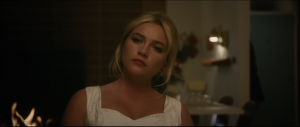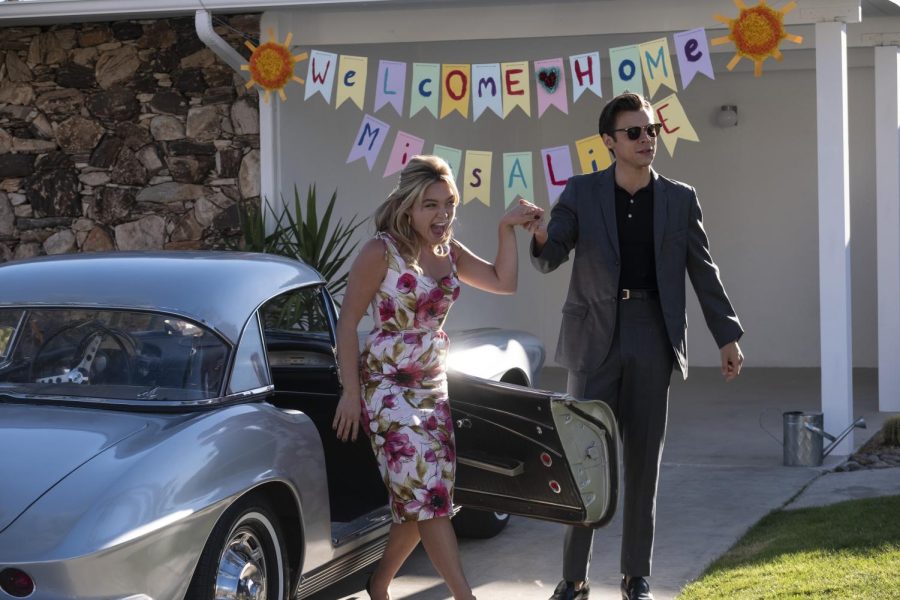
“Don’t Worry Darling” (Courtesy New Line Cinema and Warner Bros. Discovery)
Is There Much To Worry About, Darling? A ‘Don’t Worry Darling’ Review
October 4, 2022
In a world run by chauvinistic men where women are seen and not heard and Harry Styles does his best to fit in with actual actors, the movie “Don’t Worry Darling” exists.
A Wilde Ride
In her second feature film directorial outing, director Olivia Wilde creates a world of suspense, gender stratification and a crushing conservative climate encapsulated perfectly by a 1950s setting. The first half of the movie is a Norman Rockwell painting come to life, but there’s a deeper mystery lurking behind the picturesque town of Victory.
It’s a story in the same vein as “Pleasantville,” “The Stepford Wives” and “The Truman Show,” of an idyllic life that is a little too perfect. Wilde makes use of quick flashes of bizarre imagery, the repeated motifs of mirrors, eyes and the concept of suffocation intermingled with a soundtrack full of classic 1950s classics all to chip away at the facade of Victory. However, a director can only do so much with style when a script lacks substance beyond surface-level complexity. Fortunately, that is where actors come in.
Victories and Losses
Florence Pugh plays “Alice,” the doting and dutiful housewife archetype, who after increasingly strange experiences begins to question the nature of her reality. She plunges into a maddening quest to uncover the answers being kept from her. Pugh is a win in any project she takes on, and her performance in “Don’t Worry Darling” is no exception. She deserves a trip to the chiropractor after carrying the entire film on her back.
Her husband, “Jack,” played by Harry Styles, is the quintessential 1950s husband with great hair and sharp dress to match, but beyond that, there’s not much to rave about. Styles’ foray into acting has not been off to a great start and has been met with ridicule by some following his comments at the Venice Film Festival. Unfortunately, his performance in “Don’t Worry Darling” is not enough to dissuade the naysayers.

Chris Pine plays Victory’s leader, “Frank,” a patriarchal man who loves the sound of his own voice that the townsmen aspire to impress. In an interview with Maggie Gyllenhaal, Wilde stated that she based Pine’s character on Jordan Peterson, who Wilde refers to as a “pseudo-intellectual hero to the incel community.” Although he is a little limited in his role, Pine does a great job of playing the man Peterson thinks he is.
Other performances like Kiki Layne as the frenzied “Margaret” and Timothy Simons as the imposing town doctor, “Dean” are worthy of praise despite their limited screen time. Wilde herself has a small supporting role in the movie as fellow housewife “Bunny,” but the role may have been too minute for any significant praise. Actor Gemma Chan is also in the film but is given hardly anything substantial to work with.
Worth a Ticket?
While the final twist of the film would be shocking to someone who had never seen a movie before, it’s eerily timely with its poignant subject matter. The ending also makes clear why the 1950s was chosen as the setting of the film and why the antagonist was modeled after an incel messiah.
Despite a surprisingly low Rotten Tomatoes score of 38% and a middle-of-the-pack IMDB rating of 6.3, “Don’t Worry Darling” is still worth a visit to the theater.


